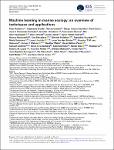Machine learning in marine ecology: an overview of techniques and applications
| dc.contributor.author | Rubbens, P | |
| dc.contributor.author | Brodie, S | |
| dc.contributor.author | Cordier, T | |
| dc.contributor.author | Destro Barcellos, D | |
| dc.contributor.author | Devos, P | |
| dc.contributor.author | Fernandes-Salvador, JA | |
| dc.contributor.author | Fincham, Jennifer Irene | |
| dc.contributor.author | Gomes, A | |
| dc.contributor.author | Handegard, Nils Olav | |
| dc.contributor.author | Howell, Kerry | |
| dc.contributor.author | Jamet, C | |
| dc.contributor.author | Kartveit, KH | |
| dc.contributor.author | Moustahfid, H | |
| dc.contributor.author | Parcerisas, Clea | |
| dc.contributor.author | Politikos, D | |
| dc.contributor.author | Possebam, Sandi | |
| dc.contributor.author | Sokolova, Maria | |
| dc.contributor.author | Uusitalo, L | |
| dc.contributor.author | Van den Bulcke, L | |
| dc.contributor.author | van Helmond, ATM | |
| dc.contributor.author | Watson, Jordan | |
| dc.contributor.author | Welch, H | |
| dc.contributor.author | Beltran Perez, Oscar Dario | |
| dc.contributor.author | Chaffron, S | |
| dc.contributor.author | Greenberg, DS | |
| dc.contributor.author | Kühn, B | |
| dc.contributor.author | Kiko, R | |
| dc.contributor.author | Lo, M | |
| dc.contributor.author | Lopes, Rubens | |
| dc.contributor.author | Möller, Klas Ove | |
| dc.contributor.author | Michaels, W | |
| dc.contributor.author | Pala, A | |
| dc.contributor.author | Romagnan, J-B | |
| dc.contributor.author | Schuchert, P | |
| dc.contributor.author | Seydi, V | |
| dc.contributor.author | Villasante, S | |
| dc.contributor.author | Malde, Ketil | |
| dc.contributor.author | Irisson, Jean-Olivier | |
| dc.date.accessioned | 2023-11-23T13:56:16Z | |
| dc.date.available | 2023-11-23T13:56:16Z | |
| dc.date.issued | 2023-09-26 | |
| dc.identifier.issn | 1054-3139 | |
| dc.identifier.issn | 1095-9289 | |
| dc.identifier.uri | https://pearl.plymouth.ac.uk/handle/10026.1/21691 | |
| dc.description.abstract |
Machine learning covers a large set of algorithms that can be trained to identify patterns in data. Thanks to the increase in the amount of data and computing power available, it has become pervasive across scientific disciplines. We first highlight why machine learning is needed in marine ecology. Then we provide a quick primer on machine learning techniques and vocabulary. We built a database of ∼1000 publications that implement such techniques to analyse marine ecology data. For various data types (images, optical spectra, acoustics, omics, geolocations, biogeochemical profiles, and satellite imagery), we present a historical perspective on applications that proved influential, can serve as templates for new work, or represent the diversity of approaches. Then, we illustrate how machine learning can be used to better understand ecological systems, by combining various sources of marine data. Through this coverage of the literature, we demonstrate an increase in the proportion of marine ecology studies that use machine learning, the pervasiveness of images as a data source, the dominance of machine learning for classification-type problems, and a shift towards deep learning for all data types. This overview is meant to guide researchers who wish to apply machine learning methods to their marine datasets. | |
| dc.format.extent | 1829-1853 | |
| dc.language | en | |
| dc.publisher | Oxford University Press (OUP) | |
| dc.subject | acoustics | |
| dc.subject | ecology | |
| dc.subject | image | |
| dc.subject | machine learning | |
| dc.subject | omics | |
| dc.subject | profiles | |
| dc.subject | remote sensing | |
| dc.subject | review | |
| dc.title | Machine learning in marine ecology: an overview of techniques and applications | |
| dc.type | Journal Article | |
| plymouth.author-url | https://www.webofscience.com/api/gateway?GWVersion=2&SrcApp=PARTNER_APP&SrcAuth=LinksAMR&KeyUT=WOS:001041998200001&DestLinkType=FullRecord&DestApp=ALL_WOS&UsrCustomerID=11bb513d99f797142bcfeffcc58ea008 | |
| plymouth.issue | 7 | |
| plymouth.volume | 80 | |
| plymouth.publication-status | Published | |
| plymouth.journal | ICES Journal of Marine Science | |
| dc.identifier.doi | 10.1093/icesjms/fsad100 | |
| plymouth.organisational-group | |Plymouth | |
| plymouth.organisational-group | |Plymouth|Research Groups | |
| plymouth.organisational-group | |Plymouth|Faculty of Science and Engineering | |
| plymouth.organisational-group | |Plymouth|Faculty of Science and Engineering|School of Biological and Marine Sciences | |
| plymouth.organisational-group | |Plymouth|Research Groups|Marine Institute | |
| plymouth.organisational-group | |Plymouth|REF 2021 Researchers by UoA | |
| plymouth.organisational-group | |Plymouth|Users by role | |
| plymouth.organisational-group | |Plymouth|Users by role|Academics | |
| plymouth.organisational-group | |Plymouth|REF 2021 Researchers by UoA|UoA07 Earth Systems and Environmental Sciences | |
| plymouth.organisational-group | |Plymouth|Users by role|Researchers in ResearchFish submission | |
| plymouth.organisational-group | |Plymouth|REF 2028 Researchers by UoA | |
| plymouth.organisational-group | |Plymouth|REF 2028 Researchers by UoA|UoA07 Earth Systems and Environmental Sciences | |
| dc.date.updated | 2023-11-23T13:55:56Z | |
| dc.rights.embargodate | 2023-11-25 | |
| dc.rights.embargodate | 2023-11-25 | |
| dc.identifier.eissn | 1095-9289 | |
| rioxxterms.versionofrecord | 10.1093/icesjms/fsad100 |


